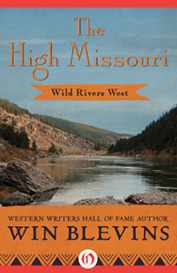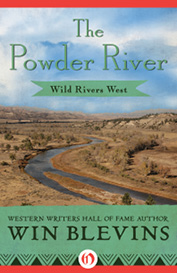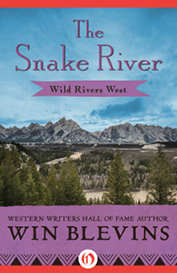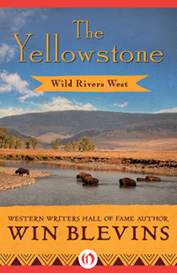The Yellowstone (28 page)
Authors: Win Blevins

Epilogue
Lisette Genet Maclean sat on the south bank of the Yellowstone river, her skirts gathered between her knees. She bared her arms to the sun. It was May in Montana territory, the moon when the grass comes fully green, the prickly pear blooms, the cotton woods leaf out thick, and the rivers rise. The moon of fecundity.
Lisette was watching a mayfly hatch. She had lots to be thinking about—such as the new season of trading, one crucial to Yellowstone House. But she was not thinking of her problems. Nor was she dwelling on the people she missed. Mac. Thomas. Smith, gone to Dartmouth College. Felice, married and living upriver. Christine, visiting St. Louis with Annemarie and Peddler. Lisette was just looking at the flies and the moving river.
The child stirred within her. Mac’s child, due in June, the moon when the horses get fat. She was heavy with the child now and walked awkwardly.
Though Lisette had lived near the Yellowstone for twenty years, she was seeing mayflies rise off the water as though for the first time. It was a mother, this river, a mother to millions of creatures she had hardly dreamt of.
A week ago a Dr. Addison had come to Yellowstone House, an Englishman and a naturalist. Lisette knew this word “naturalist” only vaguely, from the letters Smith wrote home. She was hospitable to this Addison, though she didn’t know what he wanted. When he said he was investigating insects of the Yellowstone country and classifying them by genus, species, and subspecies, she got more interested—this was science, the stuff Smith was learning.
One day Addison took Lisette along the riverbank to show her some of this science. All through the afternoon the naturalist kept exclaiming what a mother the river is, and he demonstrated. He showed her how crayfish put forth live babies in the water. How fish lay eggs in great sacs in the river bottom—Addison scooped some up for her, and they felt slimy. He pointed to the tiny, glistening eggs the water striders laid on plants that stood half in the water, and the shelled eggs the killdeer laid nearby.
Naturally, they spoke of the other creatures the river nurtures. The birds—geese, ducks, mergansers, golden-eyes, kingfishers, great blue herons, ospreys, bald eagles. The turtles and frogs, egg-layers both. The water snakes, who had live births, like mammals. Lisette didn’t know what mammals were. Addison mentioned human beings, and river creatures such as the beaver and the otter. Lisette reflected that she dreamt often of otters recently, but she said nothing.
Addison showed her some plants that grew in the river—cattails, bur reeds, lichens, mosses—and mentioned others: wild rice, watercress, plantain, arrowroot.
And then they both spotted the small white insects that were suddenly flying everywhere, and Addison told an amazing story. These, he said, were mayflies. Every year about this time they populated the sky thick as milkweed. They lived just one day in the air, then died.
But what a life they had underwater. There they thrived for about two years. First they were eggs, motionless on the river bottom. Then they were larvae, in the water on plants, restless, feeding ferociously. Then they were pupae, cocoonlike creatures, dormant. And finally they hatched and rose to the water’s surface. If a fish didn’t eat them there, they flew for one day, and died.
Lisette had seen these flies every spring of her twenty years here and paid them no attention. Yet this was what Smith, her son, was learning in college. And this kind of understanding would in time make him a physician, able to heal the wounded and the sick. She didn’t see how, but that’s what Smith said, and Addison confirmed.
She put a bare foot in the river. It was cold—the Yellowstone was always cold. Whenever she touched its cold, she felt in the remote reaches of her mind, below the surface of consciousness, Mac’s death in these waters.
Later in the summer, though, the river would be warmer, and she would swim. Lisette liked to swim.
She reached down with cupped hands, dipped water from the river, and drank deep. It tasted good, so she did it again.
She felt sleepy. The glare of the afternoon sun on the water made it hard to keep her eyes open. She tucked her feet to her bottom, lay on her side, and pulled a shawl over herself. She closed her eyes. Perhaps she would doze off.
Half-waking, perhaps half-dreaming, Lisette pictured herself swimming in the Yellowstone. This time she did not see herself alone. She saw millions of creatures swimming in the great river—otters, beaver, fish, turtles, frogs, mayflies, and myriad others. She was one of them, another living creature, busily sensing and seeking, feeding and frolicking, struggling, birthing, being.
She smiled in her dream. The child stirred within her.
Acknowledgments
Lots of hands go into the writing of a book, particularly a book about other times and other cultures. I thank four colleagues and friends especially for their guidance in writing this one: Richard S. Wheeler of Big Timber, Montana; Murphy Fox of Helena, Montana; Linda Hasselstrom of Hermosa, South Dakota; and Judge Clyde M. Hall of the Shoshone-Bannock Reservation at Fort Hall, Idaho.
About the Author
Win Blevins is the author of thirty-one books. He has received the Owen Wister Award for Lifetime Contributions to Western Literature, has twice been named Writer of the Year by Wordcraft Circle of Native Writers, has been selected for the Western Writers Hall of Fame, and has won two Spur Awards for Novel of the West. His novel about Crazy Horse,
Stone Song
, was a candidate for the Pulitzer Prize.
A native of Little Rock, Arkansas, Blevins is of Cherokee and Welsh Irish descent. He received a master’s degree from Columbia University and attended the music conservatory of the University of Southern California. He started his writing career as a music and drama reviewer for the
Los Angeles Times
and then became the entertainment editor and principal theater and movie critic for the
Los Angeles Herald Examiner
. His first book was published in 1973, and since then he has made a living as a freelance writer, publishing essays, articles, and reviews. From 2010 to 2012, Blevins served as Gaylord Family Visiting Professor of Professional Writing at the University of Oklahoma.
Blevins has five children and a growing number of grandchildren. He lives with his wife, the novelist Meredith Blevins, among the Navajos in San Juan County, Utah. He has been a river runner and has climbed mountains on three continents. His greatest loves are his family, music, and the untamed places of the West.
All rights reserved, including without limitation the right to reproduce this book or any portion thereof in any form or by any means, whether electronic or mechanical, now known or hereinafter invented, without the express written permission of the publisher.
This is a work of fiction. Names, characters, places, events, and incidents either are the product of the author’s imagination or are used fictitiously. Any resemblance to actual persons, living or dead, businesses, companies, events, or locales is entirely coincidental.
Copyright © 2012 by Winfred Blevins
Cover design by Mimi Bark
978-1-5040-1285-0
This edition published in 2015 by Open Road Integrated Media, Inc.
345 Hudson Street
New York, NY 10014


FRESH EBOOK DEALS, DELIVERED DAILY
BE THE FIRST TO KNOW ABOUT
FREE AND DISCOUNTED EBOOKS
NEW DEALS HATCH EVERY DAY
FROM OPEN ROAD MEDIA





